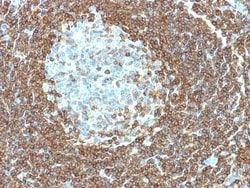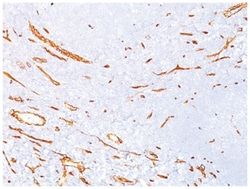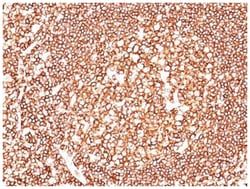Aminopeptidase N/CD13 Antibody (APN/514) - Azide and BSA Free, Novus Biologicals™
Mouse Monoclonal Antibody
Manufacturer: Fischer Scientific
The price for this product is unavailable. Please request a quote
Antigen
Aminopeptidase N/CD13
Concentration
1.0 mg/mL
Applications
Flow Cytometry, Immunohistochemistry (Paraffin), Immunofluorescence, CyTOF
Conjugate
Unconjugated
Host Species
Mouse
Research Discipline
Angiogenesis, Cellular Markers, Hematopoietic Stem Cell Markers, Immunology, Mesenchymal Stem Cell Markers, Myeloid derived Suppressor Cell, Stem Cell Markers
Formulation
PBS with No Preservative
Gene ID (Entrez)
290
Immunogen
Recombinant human CD13 protein
Primary or Secondary
Primary
Content And Storage
Store at 4C short term. Aliquot and store at -20C long term. Avoid freeze-thaw cycles.
Molecular Weight of Antigen
150 kDa
Clone
APN/514
Dilution
Flow Cytometry : 0.5 - 1 ug/million cells in 0.1 ml, Immunohistochemistry-Paraffin : 0.5 - 1.0 ug/ml, Immunofluorescence : 1 - 2 ug/ml, CyTOF-ready
Classification
Monoclonal
Form
Purified
Regulatory Status
RUO
Target Species
Human
Gene Alias
alanyl (membrane) aminopeptidase, Alanyl aminopeptidase, Aminopeptidase M, aminopeptidase N, AP-M, AP-N, CD13 antigen, CD13APN, EC 3.4.11, EC 3.4.11.2, gp150, LAP1, Microsomal aminopeptidase, Myeloid plasma membrane glycoprotein CD13, P150, PEPNhAPN
Gene Symbols
ANPEP
Isotype
IgG1 κ
Purification Method
Protein A or G purified
Test Specificity
This MAb recognizes an extracellular epitope of an integral membrane glycoprotein of 150kDa, identified as CD13. This antigen is present on most cells of myeloid origin including granulocytes, monocytes, mast cells, and GM-progenitor cells. It is also expressed by the majority of AML, CML in myeloid blast crisis, and in a smaller fraction of lymphoid leukemias. It is absent from normal lymphocytes, platelets and erythrocytes. CD13 is also present on fibroblasts; endothelial cells, epithelial cells from renal proximal tubules and intestinal brush border, bone marrow stromal cells, osteoclasts, and cells lining bile duct canaliculi. CD13 is identical to aminopeptidase N (APN), a prominent membrane-bound metalloprotease present on the surface of intestinal brush border and renal tubules. CD13 plays a role in metabolism of biologically active peptides, in phagocytosis, and in bactericidal/tumoricidal activities. It also serves as a receptor for human coronaviruses (HCV). The lineage-restricted pattern of expression of CD13 within the hemopoietic compartment suggests that it may be important in myeloid cell differentiation.
Description
- Aminopeptidase N/CD13 Monoclonal specifically detects Aminopeptidase N/CD13 in Human samples
- It is validated for ELISA.



